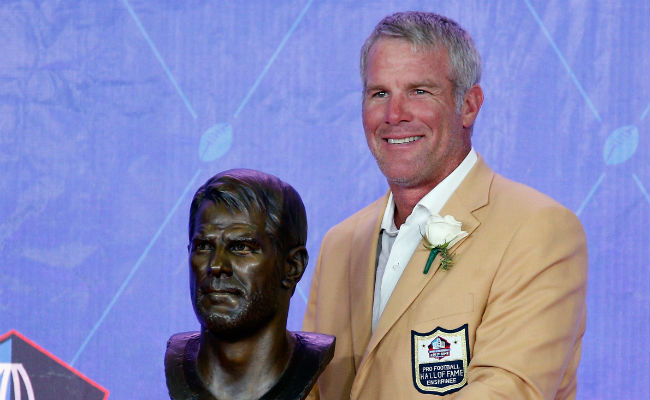
Brett Favre made a scary estimation that puts some of the most impressive accomplishments in his career in a very different light. Favre is one of the most celebrated quarterbacks in NFL history, but the Hall of Famer has become a concussion advocate in the years since retirement.
The former NFL MVP and Super Bowl champion said on Thursday’s Megyn Kelly Today that he’s experiencing short-term memory loss and made a stark assessment of how many concussions he had in his career.
Though he was only officially diagnosed with three in his career, Favre estimates that, given his fuller understanding of traumatic brain injuries, he suffered “thousands” of concussions in his 18-year NFL career.
https://www.youtube.com/watch?v=6gTXyn6CVhY
According to the Associated Press, Favre says the terms used to hide concussions need to change.
“As we’re learning about concussions,” he told Kelly, “there’s a term we use in football and maybe other sports, that I got ‘dinged.’ When you have ringing of the ears, seeing stars, that is a concussion.
“If that’s a concussion, then I’ve had hundreds, probably thousands, throughout my career, which is frightening.”
Favre’s multiple comebacks at the end of his career still get him questions about his willingness to play football, but that’s long gone now. He knows the toll the sport took on his body, and it worries him what his future holds.
“I grew up playing football. My dad was the coach, he was tough on me, he was a hard-nosed, just in-your-face-type of guy, and he didn’t know what concussions were about. We knew basically what a concussion was, but the thought process in those days was you would never come out of a game or practice because you had a little head ding. You would be considered, for lack of a better term, a sissy.
“My point in this is 30 years ago, there wasn’t a problem in anyone’s mind from playing football. It was just a matter of being tough, and the ones who stuck it out and made the most of it. Now, what we know, is it has nothing to do with toughness and that’s a lot scarier. So I look at my career as something wonderful. I didn’t know; had I known in Year 5, I would have looked at my future a bit closer as my career unfolded.”
Favre also said young children should not play football, as their brains and skulls are not developed enough to sustain the kind of head trauma that comes with the game, even at a young age. It’s not surprising given what we know medically about the sport, but hearing it come from one of the game’s brightest stars, and one known for his toughness and ability to play through injury, does signal a growing change in the way health is perceived in the football world.






